
Features | Lists
By The Staff

40 :: Stephen Malkmus
Face the Truth
(Matador)
It has been nearly 6 years since Pavement released a record, and I’m quite certain it will take another six before Stephen Malkmus is no longer referred to as “that guy from Pavement.” In any case, Malkmus’ first two solo records seemed to be purposed attempts to distance himself from his former band, and who can blame him? May be in vain, though; the “former” moniker still haunts Frank Black, and his music is as consistently dissimilar from the Pixies. I’m sure he’s realized by now that it may never happen, for better or worse.
Malkmus’ latest release, Face the Truth (the first sans–Jicks release, though they do get billing on the rear cover) is a concomitant return to form and divergence. Songs like “Pencil Riot,” “I’ve Hardly Been” and “Kindling for the Master” could easily have been cut in the late ’90s while Pavement was enticing shag–bags everywhere with their seemingly effortless arrangements. On the flip side, sublime pop tunes like “Mama,” “Malediction” and the pseudo–self–deprecation of “Post–Paint Boy” display a maturing Malkmus, with a less blurred vision of his own identity. In short, Face the Truth is a concise work, crystallizing out the growth of an artist who has embraced his past, present and future, and whose solo career shouldn’t be footnoted just yet.
Bryan Rowsell
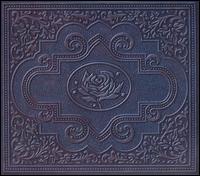
39 :: Ryan Adams and the Cardinals
Cold Roses
(Lost Highway)
Unlike the other David G. around these parts, I’ll be the first to admit that I’ve often found Monsieur Adams to be more than a little annoying —- generally being of the belief that he’s a precocious kid who takes sick pleasure in a purposeful lack of quality control when its clear that he’s obviously capable of better things. Adams doesn’t entirely break free of this habit on Cold Roses; it would have been more enjoyable to these ears on a single CD with four fewer songs (hello “Life Is Beautiful”).
Regardless, ever since Adams elected to embark on his one-man crusade to redeem The Grateful Dead in the eyes of hipsters, his records have comprised some fine listening for fans of the latter (e.g., me). Dead bassist Phil Lesh even liked Cold Roses enough to ask Adams to join him on tour. Cold Roses is the first, and best release of Adams’ 2005 trifecta, and the man is onto some serious American Beauty shit here. He somehow even manages to capture Jerry Garcia’s instantly recognizable tone during solos in tracks like the title cut and “Magnolia Mountain”—a feat that’s eluded legions of Dead cover bands for ages. Despite being a touch overlong, Roses is an eminently warm recording in which Adams sounds at least 20 years older (and wiser) than he is, and his backing band is up to the challenge, especially in their ability to provide smooth harmony vocals. And while sometimes Adams’ love for all things maudlin can render a few tracks a bit hokey, well, so was Bob Weir. Length issues aside, Cold Roses is an excellent album, and I fully second Adams’ Dead love. If you dig this, pick up Europe ’72.
David M. Goldstein
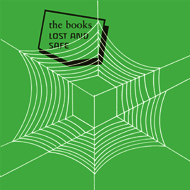
38 :: Books
Lost and Safe
(Tomlab)
For some reason it seemed like everyone got tired of the Books this year. Their third full length, Lost and Safe was released to a dull thud. After their much-lauded (and heavily flawed) debut and an impressive follow-up, a lot of supposed Books supporters hopped off the band-wagon out of either boredom or fear of unhipness. The only problem with that is that Lost and Safe may actually be the best Books album to date. It is at least on a par with The Lemon of Pink, and makes many subtle tweaks to their already impressive sonic palette.
Still present are their found sound collages and richly humming strings, but they’ve added vocals this time out and seem to have refined their ability to weave these disparate elements together. So, while the Books may seem like old hat by now and the elements that made their sound so shocking don’t seem quite as shiny or groundbreaking, they’ve actually refined their craft to the point where the songs aren’t about the sound collages or violin parts. As a result, the album doesn’t seem quite as quirky, but more like a mature statement by a polished band. While that might not make for as weird or shocking a listen as something as Thought For Food, it is even more rewarding.
Sean Ford
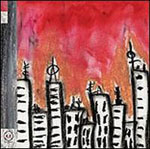
37 :: Broken Social Scene
Broken Social Scene
(Arts & Crafts)
Ever see that scene in the Wilco documentary (I Am Trying to Break Your Heart) outtakes titled “Jim O’Rourke ruins records”? That’s sort of how I (and probably Broken Social Scene, if you read the interviews) feel about BSS producer Dave Newfeld. It’s… too much.
Still, Broken Social Scene is a hell of a record. The ever-amazing Feist outdoes anything on her solo album with her performance on “7/4 (Shoreline),” and frontman Kevin Drew doesn’t sound so bad himself on the raucous “Ibi Dreams of Pavement” and “Superconnected.” With more participants than ever, most of the songs are a soupy mess of vocals and distortion which, for the most part, come out intriguing thanks to Newfeld’s obsessive tinkering. While Broken Social Scene doesn’t quite match the consistency of the masterful You Forgot It In People, very few records do. The best moments of the album – like Emily Haines’ vocals riding the bubbling guitars on “Swimmers” – are as beautiful and propulsive as anything Broken Social Scene has ever done.
David Greenwald
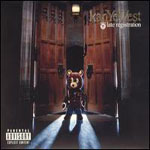
36 :: Kanye West
Late Registration
(Roc-A-Fella)
Kanyeazy, you did it again!
…. kinda. After the initial “holy shit” period—those strings! that Maroon 5 dude! Jon Brion! ”We” fucking “Major”!!!!—a settling-in occurred, and the adrenal rush subsided, and eventually the question was meekly raised: “Uh, is this really that good?” It’s a fair enough question—Kanye throws a lot at you over the course of Late Registration, and a revisit is justified, if only to discern whether or not those glowing first impressions weren’t merely the result of overstimulation. Is Late Registration this year’s Speakerboxxx / The Love Below? Is “Gold Digger” 2005’s “In Da Club”? Is Kanye a little more Wyclef, a little less Lauryn than we had thought?
Does it really matter? I say let Kanye win. Give in to “Gold Digger,” sit in awe of the stutter and roll of the drums on “Crack Music,” the fact that Paul Wall drops something hot, Nas’s fear of the beat on “We Major” (I fear it too, Nasty), Hov’s effortless stop-in on the infinitely superior “Diamonds” remix, fuck, the entirety of “Gone,” Cam’ron’s inimitable bounce (“Knock knock / Who’s there? / Killer Cam / Killer who?” Incredible!), the reaction to “Addiction” at 1 a.m. on a Saturday morning at any given house party, et cetera, ad infinitum, et al. In most quantifiable capacities, this is easily the album of the year: a trans-genre colossus towering over everything else in terms of ubiquity, talked-aboutness, quantity of hype, obnoxiousness, MTV love, radio play, magazine orgasms, knowledge of by my parents, et cetera, ad infinitum, et al.
Late Registration finds Kanye wisely dropping the whole “first rapper with a Benz and backpack” schtick, settling more fully into his position as studio wunderkind and flying by the seat of his (brightly colored plaid) pants on the mic. He’s 83% goofy charisma and 6% skill (the rest is cotton candy), but it’s not like mic skills are really that important here, because in his tireless quest to make the most populist hip hop album ever he’s made an album that’s not really even hip hop at all. Take it on these terms and its (multitudinous) faults become more bearable. Really, it’s an endearing concession: Jigga’s much-vaunted replacement can’t even fucking rap; it’s like trading Jimi Hendrix in for the Jackson 5. But fuck it: Kanye’s for everyone at this point, for you, for me, the people that vote for Grammies, the dishwasher I heard singing “Heard’em Say” tonight at work, everyone. I mean, come on. Those strings! that Maroon 5 dude! Jon Brion! ”We” fucking “Major”! And it’s one nation, under Kanye, indivisible, with liberty, et cetera, et al.
Clayton Purdom

35 :: TTC
Batards Sensibles
(Big Dada)
A Conversation with My Partner about TTC Before my Laptop Unceremoniously Explodes: A Play in Fifteen Seconds by Christopher Alexander
We open on a dark stage. CHRISTOPHER sits hunched over on his laptop. We hear the deliciously elastic sound of “Dans Le Club:” a bass heavy synth line gives way to a beat that by turns wraps around and drops underneath the French voices boasting over it. KATE, an impossibly buxom young woman, walks in behind him. They are both solely illuminated by the monitor of his computer:
Kate: What on earth is this?
Christopher: It’s TTC. Aaron’s got a twenty foot hard-on for this album, and I like it, too. What do you think?
Kate: I .. no I like it, but … is this French hip-hop?
Christopher: Indeed it is.
Kate: [A long pause] So why is it so good?
Suddenly, there is a flash of light, the music stops and puffs of smoke come from the computer. CURTAIN
Christopher Alexander
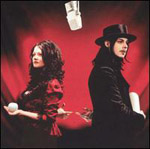
34 :: White Stripes
Get Behind Me Satan
(V2)
Underestimate Jack White at your own peril. I had initially pegged the guy to be flush out of ideas by De Stijl. Hastily recorded, aspects of Get Behind Me Satan are considerably frustrating; songs seem to randomly cut out just as they’re starting to get hot, it’s latter half never quite lives up to the promise of its first, and either I’m going deaf, or Satan requires me to crank up my stereo a few notches higher than I ought to for an album that was supposedly mastered in 2005.
But in now relying considerably on his ability to rock a piano, Jack White breathes new life into his songs, lending much of Satan a ramshackle feel (even by his standards) that sounds fresh. His newfound reliance on the ivories allows him to craft a pair of his finest ballads to date in the guise of “Forever for Her Is Over for Me” and “White Moon.” It also helps that White still never skimps on the hooks; check piano romp “My Doorbell,” an incredibly catchy toe-tapper that takes Zeppelin III to the juke joint. Likewise first single “Blue Orchid,” which overcomes its awkwardness after a few listens to reveal itself to be just as catchy as “Fell in Love with a Girl” (if not “Seven Nation Army”). Jack and Meg have yet to make an average album, and their live show remains incendiary.
David M. Goldstein

33 :: Sigur Rós
Takk...
(Geffen)
If you told a person five years ago that an Icelandic group with across-eyed, homosexual frontman playing wintery post-rock with gibberish lyrics would manage to crack the Billboard top 30 and win over a small army of followers who are just as likely to put them on shuffle alongside Dave Matthews or Snow Patrol as Tortoise… well, I doubt you’d have been taken very seriously. But listening to Takk…, the group’s most structured and accessible (and shortest) album to date, Sigur Rós’ mainstream appeal seems pretty easy to understand. As always, the songs here generally build from slow, delicate dirges to triumphant, ethereal climaxes, only now they do itfaster and more elegantly. Gone are the slow drones and mantras of 2002’s( ) in favour of glistening strings and a welcome new emphasis on drums. Songs that were once 8 minutes are now 5, and singer Jon Thor Birgisson’s angelic melodies (now sung in genuine Icelandic rather than“Hopelandic,” like you cared) are more front-and-centre than ever before. While Takk… may have been too pristine for those who dug ( )‘s morose dreamscapes, it’s the most dramatic and instantly likeable album of Sigur Rós’ career, and the more Coldplay fans it wins over, the happier we’ll all be.
Matt Stephens
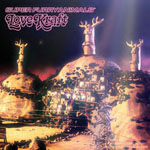
32 :: Super Furry Animals
Love Kraft
(XL)
SFA hit number seven in a series of unrelentingly solid studio outings with Love Kraft, their most refined and easy-going album, and perhaps their first as bona fide indie vets. While it doesn’t reach the gonzo heights of classics like Mwng, Radiator, or Guerrilla, Love Kraft breaks its share of new ground; the Beatles/Spiritualized space jam “Atomik Lust” is bizarrely uplifting, and the whirling, Eastern-sounding strings make “Frequency” completely mesmerizing.
In fact, the whole album is a production marvel thanks to returning whiz Mario Caldato Jr., with much help from string arranger/High Llama Sean O’Hagan, who gives the album a lush, futuristic sheen that puts some of the more laid back songs (see: “The Horn”) over the top. With every member contributing songwriting and vocal efforts, the album could have been an unfocused mess, but it’s to the credit of a group of musicians so obviously in tune with each other creatively, as well as a brilliant producer and arranger there to anchor them, that Love Kraft sits comfortably alongside any record in the SFA catalogue.
Matt Stephens

31 :: Tiger Bear Wolf
Tiger Bear Wolf
(Hello Sir!)
What’s the point of mission statements, really? What good does it do for an institution or organization to come together and print out a page decreeing their intentions? I don’t need my current employer to hand me a cute little colored slip of paper, adorned with little pictures of smiling white people, to remind that they want me to provide “excellent customer service” and be on a quest for “continual improvement.” These things are a given. Maybe it would be different if mission statements were set to music, and the message was fulfilled by its medium. That’d be kind of inspirational, right? In his review Amir recognized the opening track of Tiger Bear Wolf’s self-titled debut as a mission statement, and as far as mission statements and opening tracks go, I can’t think of one more vital to the music at hand, to the mission to be carried out. Rock ‘n roll is the “Something” of “Something Worth Saving.” That’s not critical analysis at work, that’s just hearing what the band’s screaming. Even so, if the track were completely instrumental, there’d still be no doubt that the “Something” was rock ‘n roll. The music’s as bluntly desperate as it is successful in its purpose; if saving rock ‘n roll had a sound, it would have to be the sound of this song’s blistering coda, the lead guitar delivering a classic rock line that’s monumental and irresistible enough to pull the other guitar into its wake and put the drums on the verge of losing control. Tiger Bear Wolf use their instruments to answer their own verbal plea, and it’s fucking glorious.
The rest of the album’s relentless: astute riffs backed by an intense rhythm section and fronted by passionate if not particularly pleasant vocals. It’s an experience both technically complex and viscerally immediate. Nonetheless, all the hoarse hollering and concentrated, post-punk jam rocking can be a little wearisome, exhausting to the effect that one starts to question, “What’s the point of all this angular ruckus?” Then Tiger Bear Wolf skips back to the first track, the mission statement, and one remembers the point.





